A Comparative Analysis of UK Criminal Justice and Police Powers in Law
VerifiedAdded on 2022/10/16
|9
|1878
|342
Report
AI Summary
This report provides an in-depth analysis of key UK legislation concerning criminal justice and police powers. It examines the Criminal Justice and Public Order Act 1994 (CJPOA), the Terrorism Act 2000, and the Police and Criminal Evidence Act 1984 (PACE Act), with a specific focus on the powers granted to police officers regarding stop and search procedures. The report delves into Section 60 of the CJPOA, Section 43 of the Terrorism Act, and Section 1 of the PACE Act, comparing and contrasting their provisions, including the circumstances under which they can be invoked, the limitations on police authority, and the potential for misuse. It highlights specific cases where these powers have been applied, such as the Ann Juliette Roberts case and the Kevin Gillan and Pennie Quinton case, and discusses the legal outcomes and implications of these incidents. The analysis also covers the evolution of these laws, including amendments and rulings that have shaped their application, such as the Strasbourg ruling related to the Terrorism Act. The report concludes by emphasizing the importance of balancing public safety with the protection of individual rights and the need for stricter regulations to prevent the misuse of police search powers.

Running Head: BUSINESS AND CORPORATION LAW 0
Introduction to Criminology and Criminal Justice
9/6/2019
Student
Introduction to Criminology and Criminal Justice
9/6/2019
Student
Paraphrase This Document
Need a fresh take? Get an instant paraphrase of this document with our AI Paraphraser
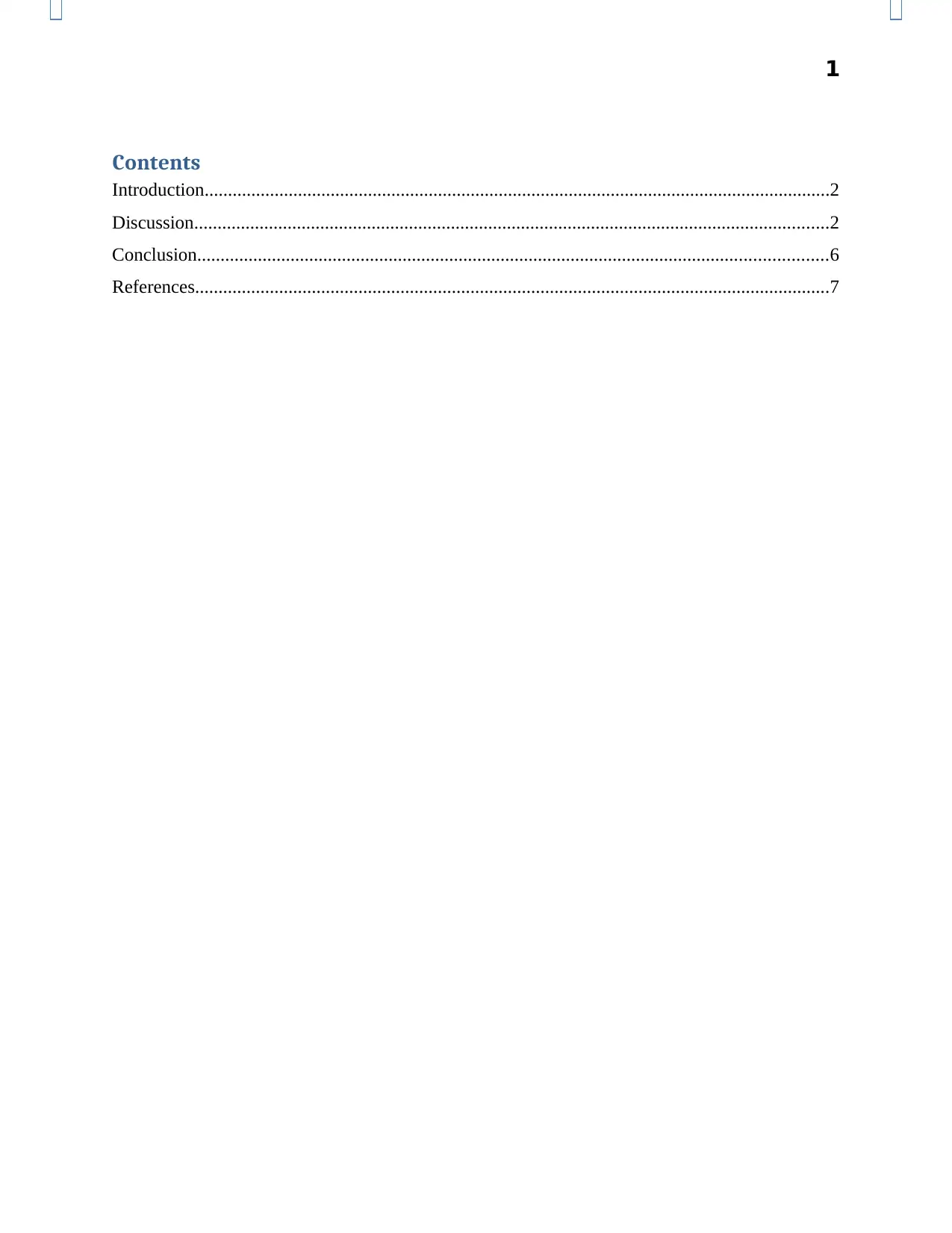
1
Contents
Introduction......................................................................................................................................2
Discussion........................................................................................................................................2
Conclusion.......................................................................................................................................6
References........................................................................................................................................7
Contents
Introduction......................................................................................................................................2
Discussion........................................................................................................................................2
Conclusion.......................................................................................................................................6
References........................................................................................................................................7
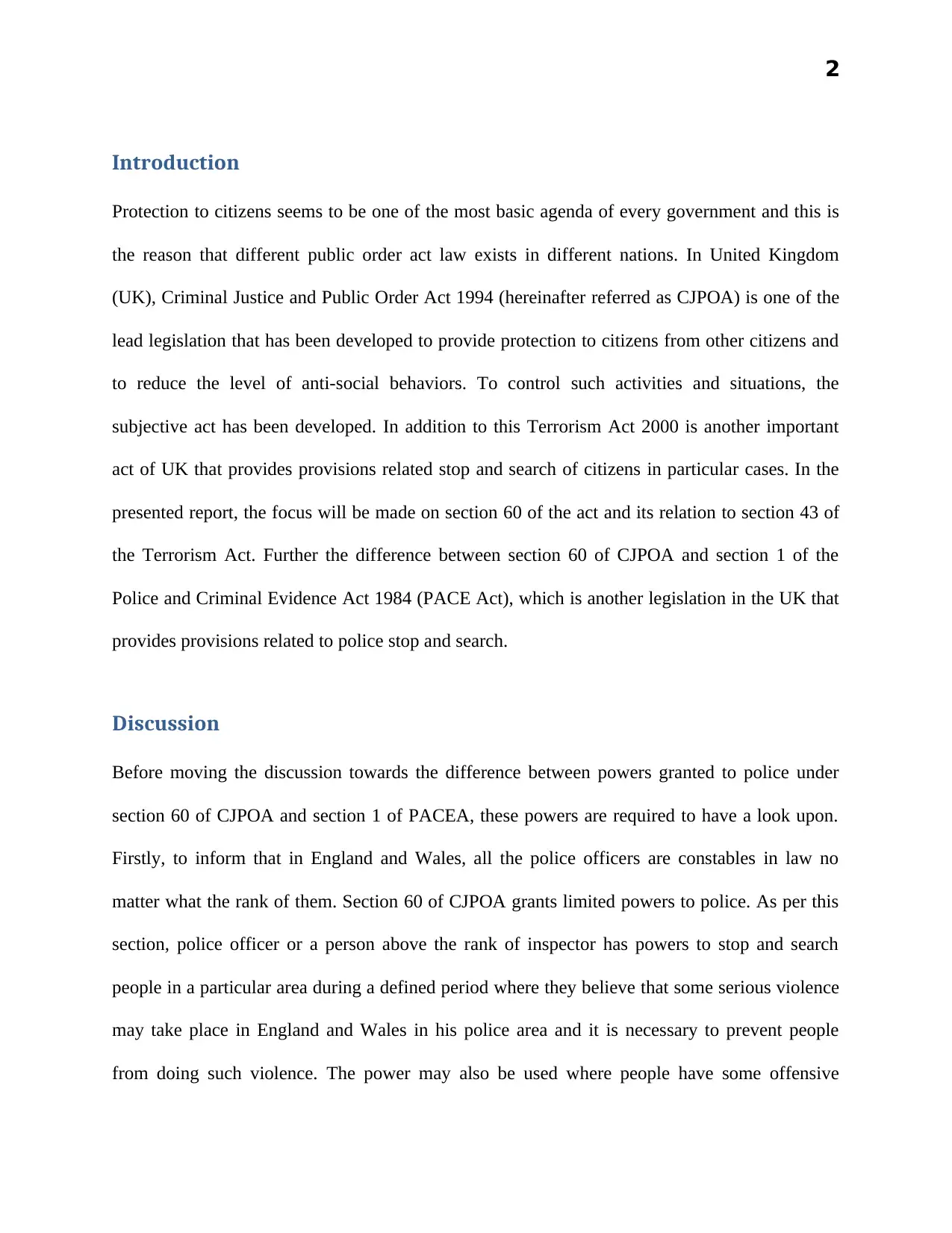
2
Introduction
Protection to citizens seems to be one of the most basic agenda of every government and this is
the reason that different public order act law exists in different nations. In United Kingdom
(UK), Criminal Justice and Public Order Act 1994 (hereinafter referred as CJPOA) is one of the
lead legislation that has been developed to provide protection to citizens from other citizens and
to reduce the level of anti-social behaviors. To control such activities and situations, the
subjective act has been developed. In addition to this Terrorism Act 2000 is another important
act of UK that provides provisions related stop and search of citizens in particular cases. In the
presented report, the focus will be made on section 60 of the act and its relation to section 43 of
the Terrorism Act. Further the difference between section 60 of CJPOA and section 1 of the
Police and Criminal Evidence Act 1984 (PACE Act), which is another legislation in the UK that
provides provisions related to police stop and search.
Discussion
Before moving the discussion towards the difference between powers granted to police under
section 60 of CJPOA and section 1 of PACEA, these powers are required to have a look upon.
Firstly, to inform that in England and Wales, all the police officers are constables in law no
matter what the rank of them. Section 60 of CJPOA grants limited powers to police. As per this
section, police officer or a person above the rank of inspector has powers to stop and search
people in a particular area during a defined period where they believe that some serious violence
may take place in England and Wales in his police area and it is necessary to prevent people
from doing such violence. The power may also be used where people have some offensive
Introduction
Protection to citizens seems to be one of the most basic agenda of every government and this is
the reason that different public order act law exists in different nations. In United Kingdom
(UK), Criminal Justice and Public Order Act 1994 (hereinafter referred as CJPOA) is one of the
lead legislation that has been developed to provide protection to citizens from other citizens and
to reduce the level of anti-social behaviors. To control such activities and situations, the
subjective act has been developed. In addition to this Terrorism Act 2000 is another important
act of UK that provides provisions related stop and search of citizens in particular cases. In the
presented report, the focus will be made on section 60 of the act and its relation to section 43 of
the Terrorism Act. Further the difference between section 60 of CJPOA and section 1 of the
Police and Criminal Evidence Act 1984 (PACE Act), which is another legislation in the UK that
provides provisions related to police stop and search.
Discussion
Before moving the discussion towards the difference between powers granted to police under
section 60 of CJPOA and section 1 of PACEA, these powers are required to have a look upon.
Firstly, to inform that in England and Wales, all the police officers are constables in law no
matter what the rank of them. Section 60 of CJPOA grants limited powers to police. As per this
section, police officer or a person above the rank of inspector has powers to stop and search
people in a particular area during a defined period where they believe that some serious violence
may take place in England and Wales in his police area and it is necessary to prevent people
from doing such violence. The power may also be used where people have some offensive
⊘ This is a preview!⊘
Do you want full access?
Subscribe today to unlock all pages.

Trusted by 1+ million students worldwide
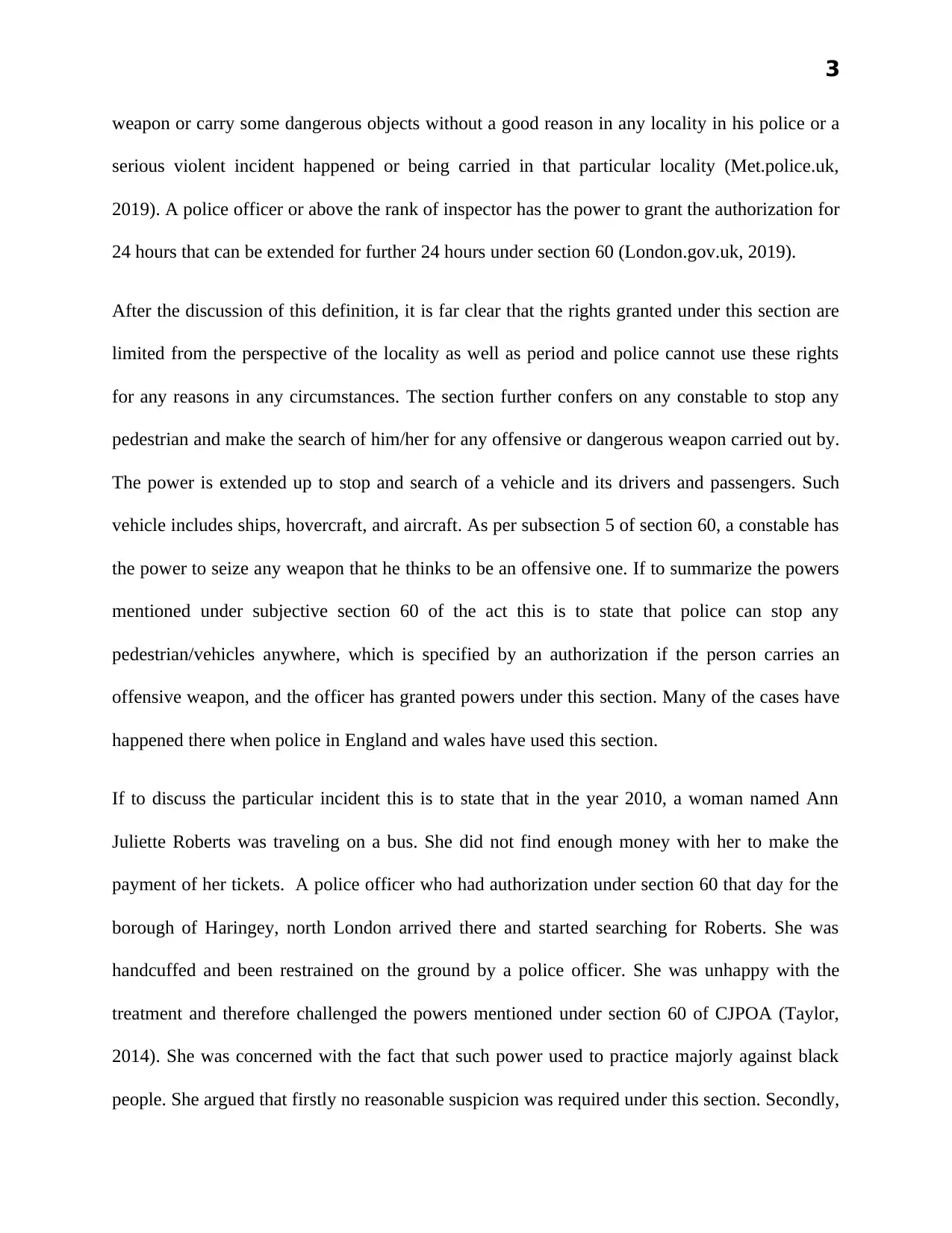
3
weapon or carry some dangerous objects without a good reason in any locality in his police or a
serious violent incident happened or being carried in that particular locality (Met.police.uk,
2019). A police officer or above the rank of inspector has the power to grant the authorization for
24 hours that can be extended for further 24 hours under section 60 (London.gov.uk, 2019).
After the discussion of this definition, it is far clear that the rights granted under this section are
limited from the perspective of the locality as well as period and police cannot use these rights
for any reasons in any circumstances. The section further confers on any constable to stop any
pedestrian and make the search of him/her for any offensive or dangerous weapon carried out by.
The power is extended up to stop and search of a vehicle and its drivers and passengers. Such
vehicle includes ships, hovercraft, and aircraft. As per subsection 5 of section 60, a constable has
the power to seize any weapon that he thinks to be an offensive one. If to summarize the powers
mentioned under subjective section 60 of the act this is to state that police can stop any
pedestrian/vehicles anywhere, which is specified by an authorization if the person carries an
offensive weapon, and the officer has granted powers under this section. Many of the cases have
happened there when police in England and wales have used this section.
If to discuss the particular incident this is to state that in the year 2010, a woman named Ann
Juliette Roberts was traveling on a bus. She did not find enough money with her to make the
payment of her tickets. A police officer who had authorization under section 60 that day for the
borough of Haringey, north London arrived there and started searching for Roberts. She was
handcuffed and been restrained on the ground by a police officer. She was unhappy with the
treatment and therefore challenged the powers mentioned under section 60 of CJPOA (Taylor,
2014). She was concerned with the fact that such power used to practice majorly against black
people. She argued that firstly no reasonable suspicion was required under this section. Secondly,
weapon or carry some dangerous objects without a good reason in any locality in his police or a
serious violent incident happened or being carried in that particular locality (Met.police.uk,
2019). A police officer or above the rank of inspector has the power to grant the authorization for
24 hours that can be extended for further 24 hours under section 60 (London.gov.uk, 2019).
After the discussion of this definition, it is far clear that the rights granted under this section are
limited from the perspective of the locality as well as period and police cannot use these rights
for any reasons in any circumstances. The section further confers on any constable to stop any
pedestrian and make the search of him/her for any offensive or dangerous weapon carried out by.
The power is extended up to stop and search of a vehicle and its drivers and passengers. Such
vehicle includes ships, hovercraft, and aircraft. As per subsection 5 of section 60, a constable has
the power to seize any weapon that he thinks to be an offensive one. If to summarize the powers
mentioned under subjective section 60 of the act this is to state that police can stop any
pedestrian/vehicles anywhere, which is specified by an authorization if the person carries an
offensive weapon, and the officer has granted powers under this section. Many of the cases have
happened there when police in England and wales have used this section.
If to discuss the particular incident this is to state that in the year 2010, a woman named Ann
Juliette Roberts was traveling on a bus. She did not find enough money with her to make the
payment of her tickets. A police officer who had authorization under section 60 that day for the
borough of Haringey, north London arrived there and started searching for Roberts. She was
handcuffed and been restrained on the ground by a police officer. She was unhappy with the
treatment and therefore challenged the powers mentioned under section 60 of CJPOA (Taylor,
2014). She was concerned with the fact that such power used to practice majorly against black
people. She argued that firstly no reasonable suspicion was required under this section. Secondly,
Paraphrase This Document
Need a fresh take? Get an instant paraphrase of this document with our AI Paraphraser
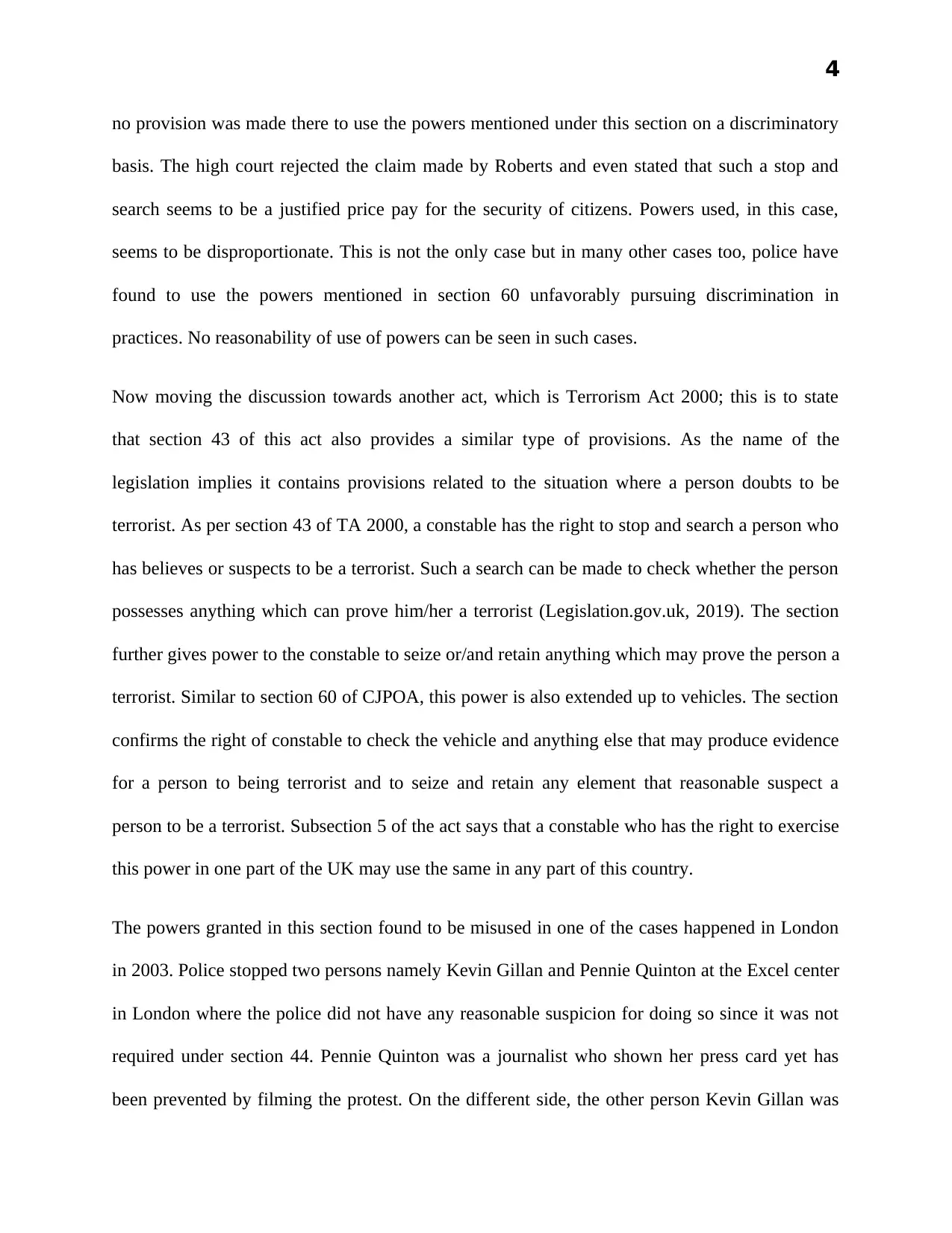
4
no provision was made there to use the powers mentioned under this section on a discriminatory
basis. The high court rejected the claim made by Roberts and even stated that such a stop and
search seems to be a justified price pay for the security of citizens. Powers used, in this case,
seems to be disproportionate. This is not the only case but in many other cases too, police have
found to use the powers mentioned in section 60 unfavorably pursuing discrimination in
practices. No reasonability of use of powers can be seen in such cases.
Now moving the discussion towards another act, which is Terrorism Act 2000; this is to state
that section 43 of this act also provides a similar type of provisions. As the name of the
legislation implies it contains provisions related to the situation where a person doubts to be
terrorist. As per section 43 of TA 2000, a constable has the right to stop and search a person who
has believes or suspects to be a terrorist. Such a search can be made to check whether the person
possesses anything which can prove him/her a terrorist (Legislation.gov.uk, 2019). The section
further gives power to the constable to seize or/and retain anything which may prove the person a
terrorist. Similar to section 60 of CJPOA, this power is also extended up to vehicles. The section
confirms the right of constable to check the vehicle and anything else that may produce evidence
for a person to being terrorist and to seize and retain any element that reasonable suspect a
person to be a terrorist. Subsection 5 of the act says that a constable who has the right to exercise
this power in one part of the UK may use the same in any part of this country.
The powers granted in this section found to be misused in one of the cases happened in London
in 2003. Police stopped two persons namely Kevin Gillan and Pennie Quinton at the Excel center
in London where the police did not have any reasonable suspicion for doing so since it was not
required under section 44. Pennie Quinton was a journalist who shown her press card yet has
been prevented by filming the protest. On the different side, the other person Kevin Gillan was
no provision was made there to use the powers mentioned under this section on a discriminatory
basis. The high court rejected the claim made by Roberts and even stated that such a stop and
search seems to be a justified price pay for the security of citizens. Powers used, in this case,
seems to be disproportionate. This is not the only case but in many other cases too, police have
found to use the powers mentioned in section 60 unfavorably pursuing discrimination in
practices. No reasonability of use of powers can be seen in such cases.
Now moving the discussion towards another act, which is Terrorism Act 2000; this is to state
that section 43 of this act also provides a similar type of provisions. As the name of the
legislation implies it contains provisions related to the situation where a person doubts to be
terrorist. As per section 43 of TA 2000, a constable has the right to stop and search a person who
has believes or suspects to be a terrorist. Such a search can be made to check whether the person
possesses anything which can prove him/her a terrorist (Legislation.gov.uk, 2019). The section
further gives power to the constable to seize or/and retain anything which may prove the person a
terrorist. Similar to section 60 of CJPOA, this power is also extended up to vehicles. The section
confirms the right of constable to check the vehicle and anything else that may produce evidence
for a person to being terrorist and to seize and retain any element that reasonable suspect a
person to be a terrorist. Subsection 5 of the act says that a constable who has the right to exercise
this power in one part of the UK may use the same in any part of this country.
The powers granted in this section found to be misused in one of the cases happened in London
in 2003. Police stopped two persons namely Kevin Gillan and Pennie Quinton at the Excel center
in London where the police did not have any reasonable suspicion for doing so since it was not
required under section 44. Pennie Quinton was a journalist who shown her press card yet has
been prevented by filming the protest. On the different side, the other person Kevin Gillan was
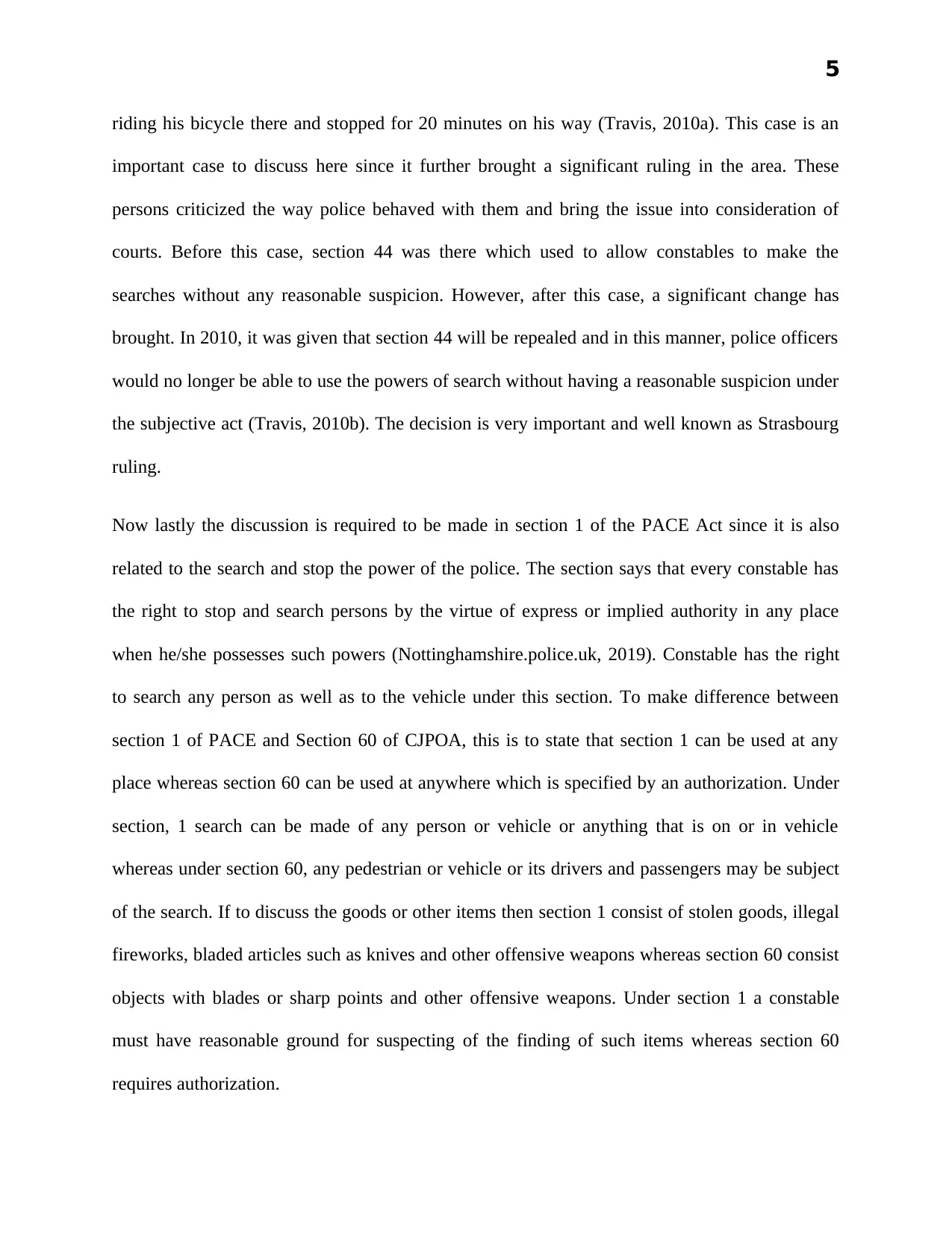
5
riding his bicycle there and stopped for 20 minutes on his way (Travis, 2010a). This case is an
important case to discuss here since it further brought a significant ruling in the area. These
persons criticized the way police behaved with them and bring the issue into consideration of
courts. Before this case, section 44 was there which used to allow constables to make the
searches without any reasonable suspicion. However, after this case, a significant change has
brought. In 2010, it was given that section 44 will be repealed and in this manner, police officers
would no longer be able to use the powers of search without having a reasonable suspicion under
the subjective act (Travis, 2010b). The decision is very important and well known as Strasbourg
ruling.
Now lastly the discussion is required to be made in section 1 of the PACE Act since it is also
related to the search and stop the power of the police. The section says that every constable has
the right to stop and search persons by the virtue of express or implied authority in any place
when he/she possesses such powers (Nottinghamshire.police.uk, 2019). Constable has the right
to search any person as well as to the vehicle under this section. To make difference between
section 1 of PACE and Section 60 of CJPOA, this is to state that section 1 can be used at any
place whereas section 60 can be used at anywhere which is specified by an authorization. Under
section, 1 search can be made of any person or vehicle or anything that is on or in vehicle
whereas under section 60, any pedestrian or vehicle or its drivers and passengers may be subject
of the search. If to discuss the goods or other items then section 1 consist of stolen goods, illegal
fireworks, bladed articles such as knives and other offensive weapons whereas section 60 consist
objects with blades or sharp points and other offensive weapons. Under section 1 a constable
must have reasonable ground for suspecting of the finding of such items whereas section 60
requires authorization.
riding his bicycle there and stopped for 20 minutes on his way (Travis, 2010a). This case is an
important case to discuss here since it further brought a significant ruling in the area. These
persons criticized the way police behaved with them and bring the issue into consideration of
courts. Before this case, section 44 was there which used to allow constables to make the
searches without any reasonable suspicion. However, after this case, a significant change has
brought. In 2010, it was given that section 44 will be repealed and in this manner, police officers
would no longer be able to use the powers of search without having a reasonable suspicion under
the subjective act (Travis, 2010b). The decision is very important and well known as Strasbourg
ruling.
Now lastly the discussion is required to be made in section 1 of the PACE Act since it is also
related to the search and stop the power of the police. The section says that every constable has
the right to stop and search persons by the virtue of express or implied authority in any place
when he/she possesses such powers (Nottinghamshire.police.uk, 2019). Constable has the right
to search any person as well as to the vehicle under this section. To make difference between
section 1 of PACE and Section 60 of CJPOA, this is to state that section 1 can be used at any
place whereas section 60 can be used at anywhere which is specified by an authorization. Under
section, 1 search can be made of any person or vehicle or anything that is on or in vehicle
whereas under section 60, any pedestrian or vehicle or its drivers and passengers may be subject
of the search. If to discuss the goods or other items then section 1 consist of stolen goods, illegal
fireworks, bladed articles such as knives and other offensive weapons whereas section 60 consist
objects with blades or sharp points and other offensive weapons. Under section 1 a constable
must have reasonable ground for suspecting of the finding of such items whereas section 60
requires authorization.
⊘ This is a preview!⊘
Do you want full access?
Subscribe today to unlock all pages.

Trusted by 1+ million students worldwide
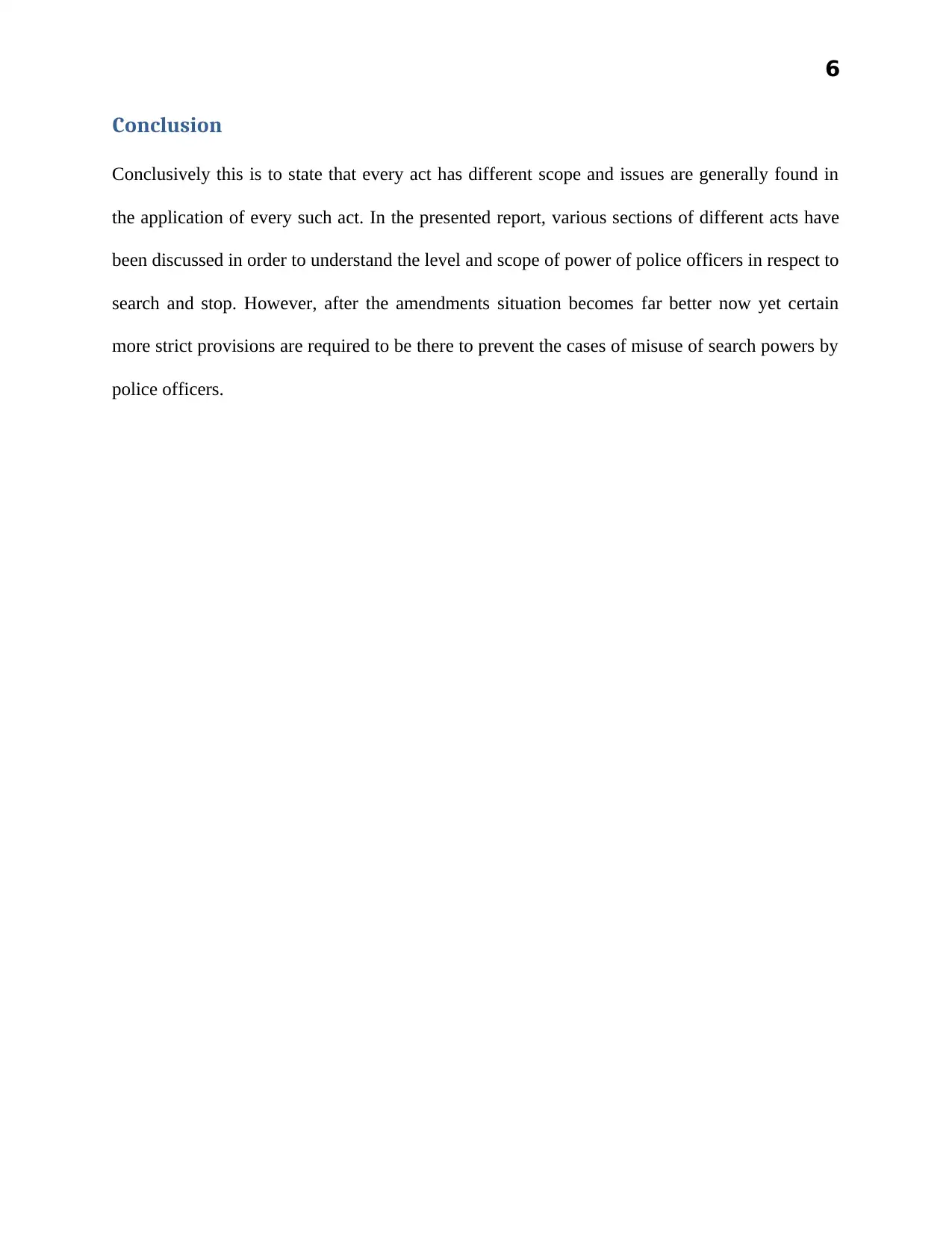
6
Conclusion
Conclusively this is to state that every act has different scope and issues are generally found in
the application of every such act. In the presented report, various sections of different acts have
been discussed in order to understand the level and scope of power of police officers in respect to
search and stop. However, after the amendments situation becomes far better now yet certain
more strict provisions are required to be there to prevent the cases of misuse of search powers by
police officers.
Conclusion
Conclusively this is to state that every act has different scope and issues are generally found in
the application of every such act. In the presented report, various sections of different acts have
been discussed in order to understand the level and scope of power of police officers in respect to
search and stop. However, after the amendments situation becomes far better now yet certain
more strict provisions are required to be there to prevent the cases of misuse of search powers by
police officers.
Paraphrase This Document
Need a fresh take? Get an instant paraphrase of this document with our AI Paraphraser
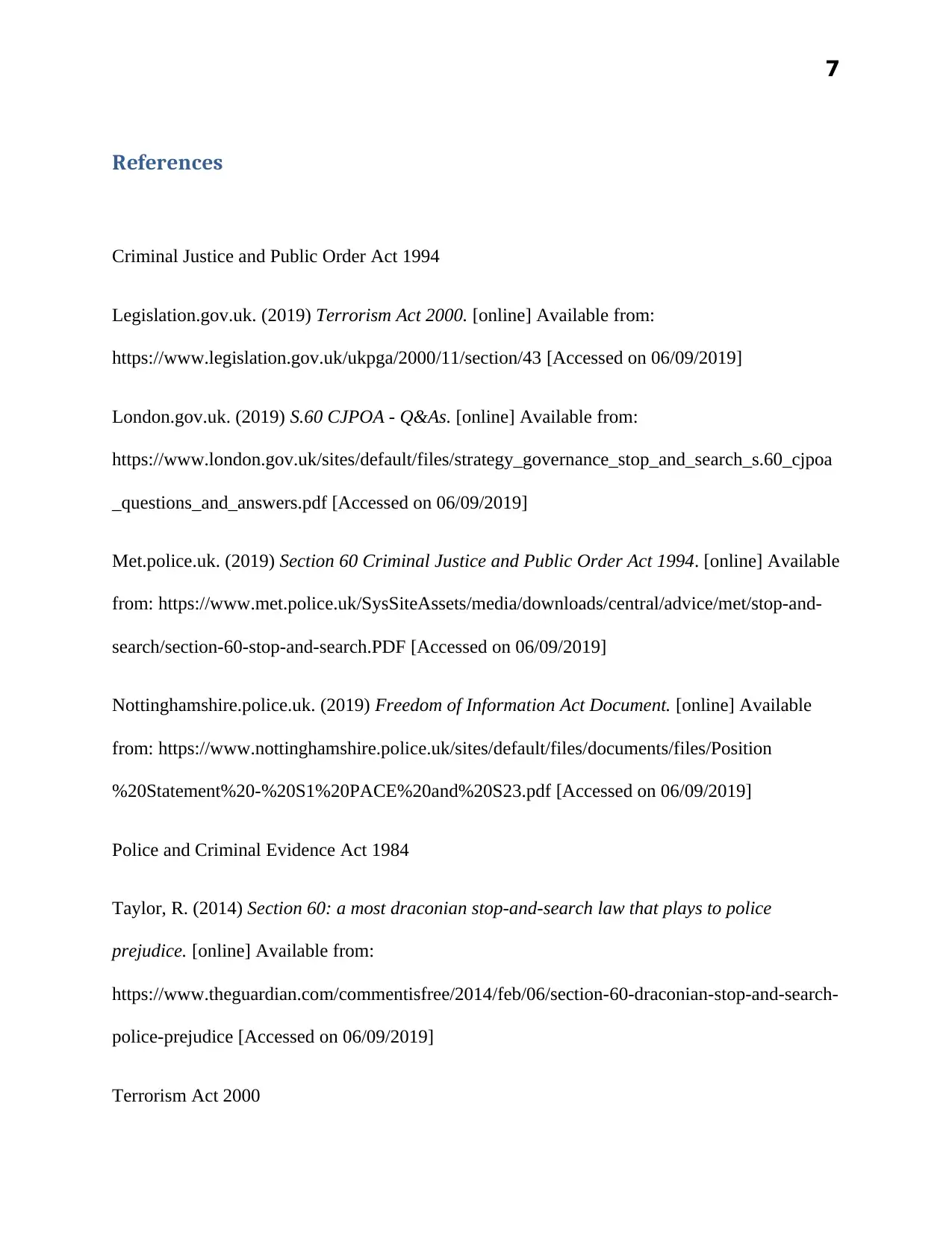
7
References
Criminal Justice and Public Order Act 1994
Legislation.gov.uk. (2019) Terrorism Act 2000. [online] Available from:
https://www.legislation.gov.uk/ukpga/2000/11/section/43 [Accessed on 06/09/2019]
London.gov.uk. (2019) S.60 CJPOA - Q&As. [online] Available from:
https://www.london.gov.uk/sites/default/files/strategy_governance_stop_and_search_s.60_cjpoa
_questions_and_answers.pdf [Accessed on 06/09/2019]
Met.police.uk. (2019) Section 60 Criminal Justice and Public Order Act 1994. [online] Available
from: https://www.met.police.uk/SysSiteAssets/media/downloads/central/advice/met/stop-and-
search/section-60-stop-and-search.PDF [Accessed on 06/09/2019]
Nottinghamshire.police.uk. (2019) Freedom of Information Act Document. [online] Available
from: https://www.nottinghamshire.police.uk/sites/default/files/documents/files/Position
%20Statement%20-%20S1%20PACE%20and%20S23.pdf [Accessed on 06/09/2019]
Police and Criminal Evidence Act 1984
Taylor, R. (2014) Section 60: a most draconian stop-and-search law that plays to police
prejudice. [online] Available from:
https://www.theguardian.com/commentisfree/2014/feb/06/section-60-draconian-stop-and-search-
police-prejudice [Accessed on 06/09/2019]
Terrorism Act 2000
References
Criminal Justice and Public Order Act 1994
Legislation.gov.uk. (2019) Terrorism Act 2000. [online] Available from:
https://www.legislation.gov.uk/ukpga/2000/11/section/43 [Accessed on 06/09/2019]
London.gov.uk. (2019) S.60 CJPOA - Q&As. [online] Available from:
https://www.london.gov.uk/sites/default/files/strategy_governance_stop_and_search_s.60_cjpoa
_questions_and_answers.pdf [Accessed on 06/09/2019]
Met.police.uk. (2019) Section 60 Criminal Justice and Public Order Act 1994. [online] Available
from: https://www.met.police.uk/SysSiteAssets/media/downloads/central/advice/met/stop-and-
search/section-60-stop-and-search.PDF [Accessed on 06/09/2019]
Nottinghamshire.police.uk. (2019) Freedom of Information Act Document. [online] Available
from: https://www.nottinghamshire.police.uk/sites/default/files/documents/files/Position
%20Statement%20-%20S1%20PACE%20and%20S23.pdf [Accessed on 06/09/2019]
Police and Criminal Evidence Act 1984
Taylor, R. (2014) Section 60: a most draconian stop-and-search law that plays to police
prejudice. [online] Available from:
https://www.theguardian.com/commentisfree/2014/feb/06/section-60-draconian-stop-and-search-
police-prejudice [Accessed on 06/09/2019]
Terrorism Act 2000
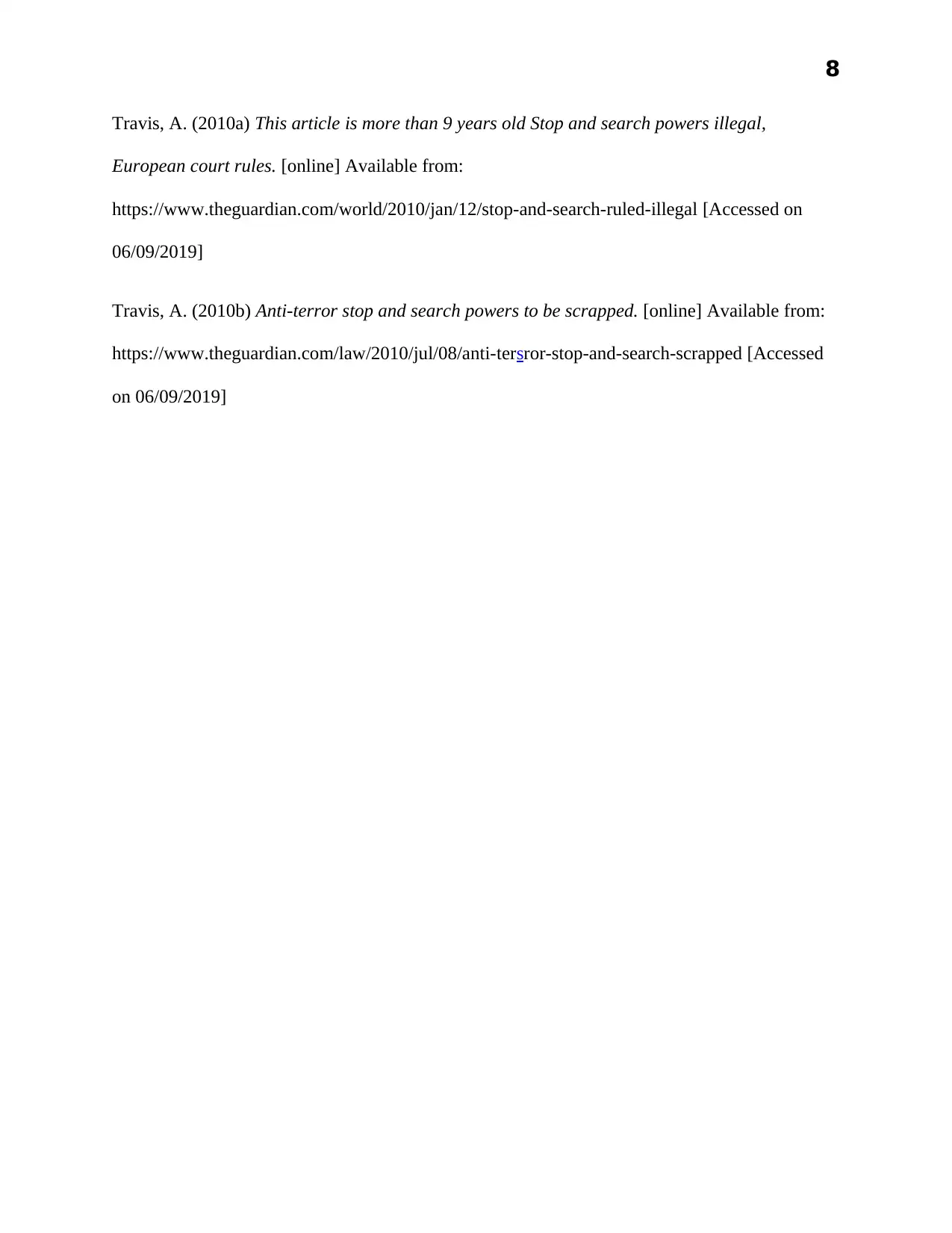
8
Travis, A. (2010a) This article is more than 9 years old Stop and search powers illegal,
European court rules. [online] Available from:
https://www.theguardian.com/world/2010/jan/12/stop-and-search-ruled-illegal [Accessed on
06/09/2019]
Travis, A. (2010b) Anti-terror stop and search powers to be scrapped. [online] Available from:
https://www.theguardian.com/law/2010/jul/08/anti-tersror-stop-and-search-scrapped [Accessed
on 06/09/2019]
Travis, A. (2010a) This article is more than 9 years old Stop and search powers illegal,
European court rules. [online] Available from:
https://www.theguardian.com/world/2010/jan/12/stop-and-search-ruled-illegal [Accessed on
06/09/2019]
Travis, A. (2010b) Anti-terror stop and search powers to be scrapped. [online] Available from:
https://www.theguardian.com/law/2010/jul/08/anti-tersror-stop-and-search-scrapped [Accessed
on 06/09/2019]
⊘ This is a preview!⊘
Do you want full access?
Subscribe today to unlock all pages.

Trusted by 1+ million students worldwide
1 out of 9
Related Documents
Your All-in-One AI-Powered Toolkit for Academic Success.
+13062052269
info@desklib.com
Available 24*7 on WhatsApp / Email
![[object Object]](/_next/static/media/star-bottom.7253800d.svg)
Unlock your academic potential
Copyright © 2020–2026 A2Z Services. All Rights Reserved. Developed and managed by ZUCOL.





